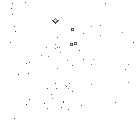~~* The Singing Falls Stream Restoration Project *~~
 ϕ
ϕ
~~* Driving Toward Salmon Recovery *~~
The family car may not look much like salmon habitat, but there is an intimate connection between the way we use our automobiles and the safety of the rivers as a highway for fish.
Oil is a major environmental pollutant. One quart of motor oil is enough to contaminate 250,000 gallons of water, yet Americans annually dump a third of a billion gallons of used motor oil into the environment. What's more, 21 million pounds of antifreeze, extremely toxic to fish and other organisms, are allowed to pollute our lands and waters each year. Additionally, millions of pounds of lead and other heavy metals, oil, and rubber deposited on the roads gets washed down storm drains and into our streams. Given that toxins in the water can affect the reproductive health, growth and survival of fish, the link between the road and the river is all too strong. (And this says nothing about the impact of drilling for oil, or the effects of oil spills).
Roads can also have a direct impact on salmon. Road-building and maintenance can result in the filling or alteration of wetlands and other flood-plain areas that provide important salmon habitat. Road building and maintenance can result in the removal of streamside vegetation that provides necessary shade and nutrients for fish. Herbicides used to kill roadside weeds can also harm fish if they get into nearby waterways. Both road construction and off-road-vehicle use can destroy soil cover and add to erosion. Excess sediment in the creeks can clog the gravel beds where salmon spawn, impeding the flow of oxygenated water that eggs need to survive.
The best way to keep oil and fuel residues out of the environment is to reduce vehicle use in the first place. The next best step is to use vehicles with maximum efficiency. Help the salmon by taking the following route to cleaner rivers:
Walk or bicycle when possible and avoid unnecessary car trips by consolidating errands.
Use mass transit where available or carpool as often as possible.
Drive the most fuel-efficient vehicle that meets your needs, and keep the engine tuned and the tires adequately inflated.
Recycle used motor oil; never dump it down a storm drain or onto the land. Wipe up motor oil drips wherever they occur. Be sure to recycle antifreeze, too; many auto shops will accept it.
Wash you car on the lawn, using non-toxic low phosphate cleansers. A lawn benefits from the extra nutrients; a stream does not.. Use a shut-off nozzle on the hose, so as not to waste water.
For more information on what you can do at home to help salmon recovery efforts in the Pacific Northwest, please contact your local watershed restoration group, soil and water conservation district, or Pacific States Marine Fisheries Commission, 45 SE 82nd Dr., Suite 100, Gladstone, OR 97027-2522.
Stream Index
top






